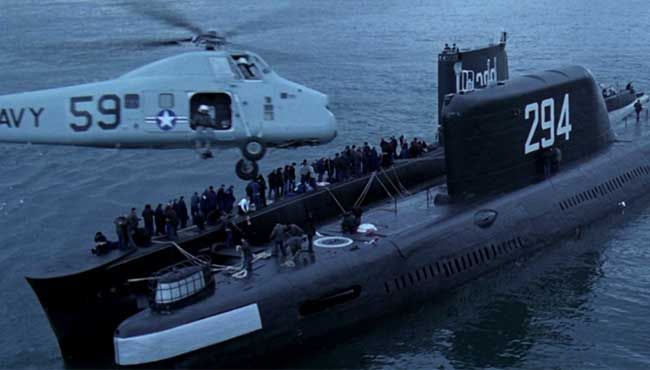
Soviet Sucmarine captains gotta hustle!
With the recent release of Ed Harris and David Duchovny’s submarine thriller Phantom to homes., I took the opportunity to review it. It’s pretty terrible. That doesn’t make for much of an article, but I was reminded very much of Kathryn Bigelow’s take on the Soviet navy over a decade ago in K-19: The Widowmaker, a film that didn’t woo critics or dollars to the box office, but it impressed me. In discovering how different they were, I was surprised at how similar they were. So where did they both go so wrong in two totally different ways?

The K-19’s crew being scrubbed clean of radiation in the North Atlantic.
The Story
Both films take place in the 1960s, claiming to be inspired by true events. While K-19 was criticized with its creative liberties, it’s practically a historical mirror compared to Phantom‘s yarn. Captains Polinen (Liam Neeson) and Demi (Ed Harris) are relieved of their commands at the behest of Moscow’s goals.
In K-19, Moscow dispatches Captain Vostrikov (Harrison Ford) to relief Polenin and steer the nuclear sub to the Arctic launch a test missile before taking a patrol off America’s eastern seaboard. During a series of harsh drills, the ship’s cooling system busts and the reactor nearly melts down before a series of brave reactor techs hussle in to cool the ship’s core with drinking water before they trigger a nuclear detonation between the two reactors and the warheads onboard.
In Phantom, David Duchovy’s KGB-affiliated Bruni equips Demi’s ancient, diesel ship with an emitter that allows them to assume the signature of any vessel they choose. Bruni and his underlings highjack the ship and prepare to launch a missile under the disguise of a Chinese vessel, triggering World War III between Mao’s state and the United States, allowing the Soviet Union to sit back and enjoy the fireworks. It’s largely fantasy as the events of K-129 were never disclosed by either government, but it’s a bit silly watching Harris and Duchovny philosophize about empathy and the fate of the world.
In the end, we sympathize with Ford’s Vostrikov as his decisions straddle the line between keeping his crew alive – the very men surrounding him and becoming sicker and sicker of radiation poisoning with each passing hour – and obeying the wishes of the Soviet State, who’d rather see all those men fry than tarnish the image of the Motherland for even the briefest moment. Duchovy’s Bruni is a comic book villain hampered by the actor’s lack of dramatic range.
So how did these films get here?






Don't Keep This a
Secret, Share It